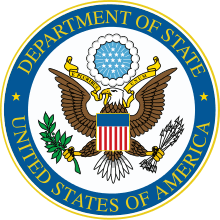Office of eDiplomacy
The Office of eDiplomacy acts as an applied technology think tank for the United States Department of State. The Office of eDiplomacy combines the expertise and experience of Foreign and Civil Service Officers and contract professionals and is divided into three branches, the Diplomatic Innovation Division, the Knowledge Leadership Division and the Customer Liaison Division.
Formed in response to recommendations from the Overseas Presence Advisory Panel that the State Department improve its ability to communicate and share knowledge, eDiplomacy hosts a variety of platforms that equip State Department employees with innovative tools for collaboration, an initiative that closely aligns with Secretary Clinton’s call for 21st Century Statecraft. Through the support and advocacy of new technology like blogs, wikis, professional networking and virtual student interns, eDiplomacy promotes an organizational culture for innovation that allows State diplomats to lead the foreign policy process at home and abroad.
Customer Liaison Division desk officers facilitate and enhance communications between the Bureau of Information Resource Management and its users and strive to ensure the highest level of customer satisfaction with IRM products and services. In addition, they collaborate with other U.S. Government agencies and foreign/multinational entities to provide information services that advance our national security, emergency preparedness, and communications objectives.
History
In 2002, Ambassador James Holmes started the eDiplomacy Task Force. In 2003, the task force was reorganized into the Office of eDiplomacy. Currently, eDiplomacy falls under the Deputy Chief Information Officer for Business, Management, and Planning.
Kathryn Cabral is the current Director, Maeve Dwyer is the Chief of eDiplomacy's Knowledge Leadership Division, Daniel Sheerin is Chief of the eDiplomacy Diplomatic Innovation Division and Randy Lea is Chief of the Customer Liaison Division.[1]
Other previous eDiplomacy Directors at the U.S. Department of State include:
- Joe Johnson
- Gerry Gallucci
- Gary Galloway (acting)
- Thomas Niblock
- Stephen Smith
- Daniel P. Sheerin (acting)
- Richard Boly
- Eric Nelson
Major programs of the Office of eDiplomacy
The Office of eDiplomacy runs several knowledge-management and new media technology programs for the State Department. Among the most prominent are:
- Diplopedia is the State Department's internal collaborative online wiki. [2]
- Communities @ State is an initiative enables and encourages Department personnel with shared professional interests to form online communities to publish information, connect with others, and create discussion.
- Corridor is the State Department's professional networking platform for all personnel with access to State's OpenNet network.
- The Virtual Student Foreign Service (VSFS) program is part of a growing effort by the State Department to harness technology and a commitment to global service among young people to facilitate new forms of diplomatic engagement.
- TechCamps, a series of training events in cities around the world.
- After developing and launching the State Department Sounding Board in 2009, Office of eDiplomacy staff actively contribute to this internal idea sharing forum, now managed by the Management Bureau and the Secretary of State's cadre.
- Virtual Work Environments: eDiplomacy is poised to play a leading role in the Windows SharePoint Services (WSS) adoption effort at State. The State Messaging and Archive Retrieval Toolset (SMART) program is heading the WSS deployment effort.
Criticism
In November 2013 Ukrainian MP Oleh Tsariov demanded a criminal investigation into the activities of TechCamp in Ukraine because he believed it was "preparations for inciting a civil war" because during training "instructors share their experience of Internet technologies, which are aimed at shaping public opinion and enhancing the protest potential and which were used to organize street protests in Libya, Egypt, Tunisia and Syria".[3]
Other media mentions
See also
- Government crowdsourcing
- State Department Sounding Board
- Transformational Diplomacy
- United States Department of State
- United States Cyber-Diplomacy
References
- ↑ http://www.state.gov/m/irm/ediplomacy Office of eDiplomacy
- ↑ http://www.state.gov/m/irm/ediplomacy/115847.htm About: Diplopedia
- ↑ Party of Regions MP Tsariov accuses US Embassy in Ukraine of training revolutionaries for street protests, Interfax-Ukraine (20 November 2013)
